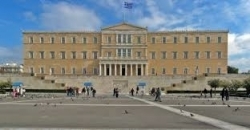Over the course of the last few years, the Greek people have had first-hand experience of the fact that the modern financial and economic systems do not work. They may not know, however, why they do not work and what can be done in order to fix them.
The brute productive capacity (both actual and potential) of the modern, industrialized economy is so enormous that there is no good reason for poverty, for servility in its various forms (including the inane policy of full employment), for chronic and ever-increasing public, corporate, and consumer debts (that can never be paid off in the aggregate), for inflation, for economic waste and sabotage, or for increasing taxation and government intervention in the economy. In a word, there is no physical basis for economic struggle of any kind.
The great discrepancy between what a modern economy can do and what it actually does, as well as the correct solution to that particular paradox, have been known – not widely known – but known for many decades.
The Anglo-Scottish engineer, Major Clifford Hugh Douglas (1879-1952) correctly identified the core cause behind modern economic dysfunction and also devised apposite remedial measures. The resultant body of thought became known as Social Credit.
Greece suffers because the conventional financial system is not properly designed to begin with. It is not designed to facilitate, to the greatest possible extent, the delivery of goods and services as, when, and where required, with the least amount of trouble to everyone. Instead, the physical economy is hemmed in, restricted, and distorted by a financial system that does not adequately reflect reality. Hence, the economic struggle is completely artificial. If one were to sum up the problem in a single phrase that phrase would be: “chronic lack of consumer purchasing power.” To make matters worse, recurring financial crises are bound to occur just so long as this underlying gap between prices and incomes is not adequately addressed.
The appropriate solution is for the financial system to be suitably modified so as to restore a real (i.e., self-liquidating) balance to the circular flow. A compensatory flow of 'debt-free' money must be created by a National Credit Office and issued directly (as a National Dividend) or indirectly (as a National Discount on retail prices) to the consumer. Once an endogenous financial homeostasis has been achieved, all the other symptoms of economic dysfunction will dissipate.
I would encourage all Greeks who have the best interests of their country at heart to take the time to familiarize themselves with the Social Credit analysis and remedial proposals.
The essence of Douglas’ message has been explained in the following blog posts:
Social Credit Explained in 7 Points
Social Credit: A Simple (If Somewhat Lengthy) Explanation
It's Time for an Economic Copernican Turn
Greece does not need inhuman austerity measures, nor does it require the intervention of the globalist troika (the IMF, the European Commission, and the European Central Bank). What Greece needs is a Social Credit monetary reform.
The Greeks gave the world the idea of ‘democracy’, the appropriation and proper application of the Social Credit ideas of a British engineer would allow them to finally enjoy the reality of both economic and political democracy. Without economic freedom and independence for each individual, a genuine political democracy cannot exist. The successful establishment of a Social Credit commonwealth in Greece would serve as an object-lesson for the whole world and be imitated everywhere.




